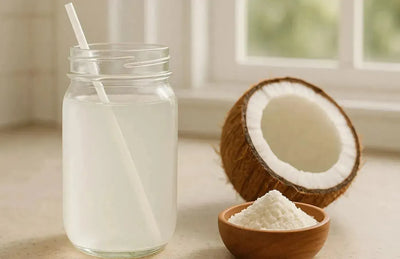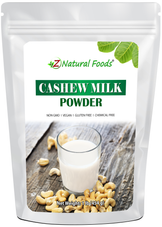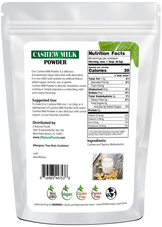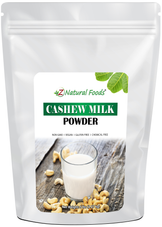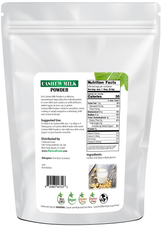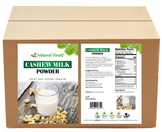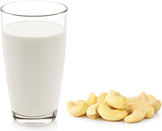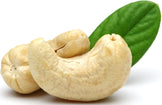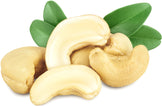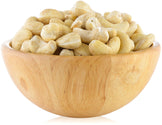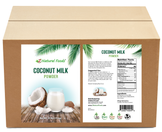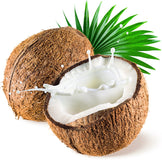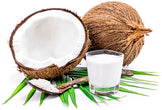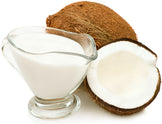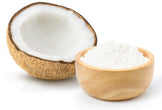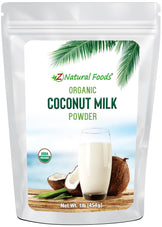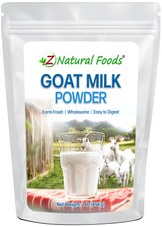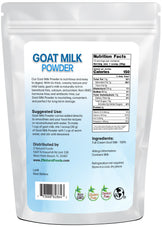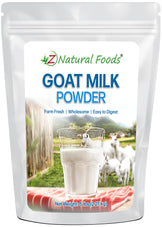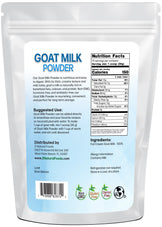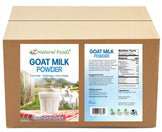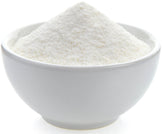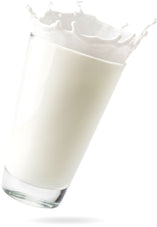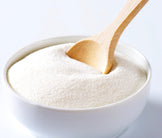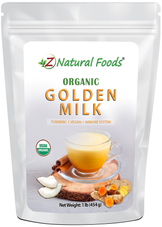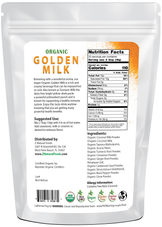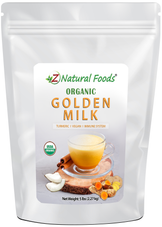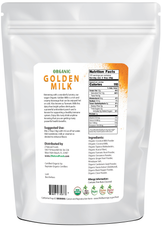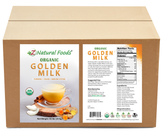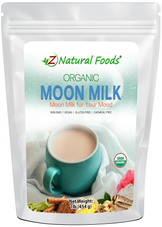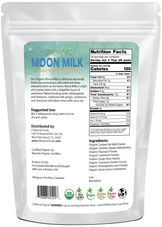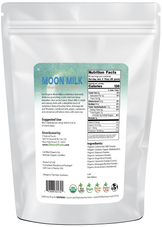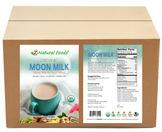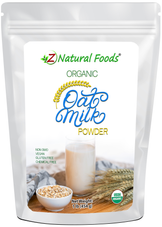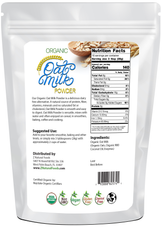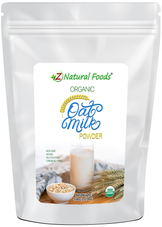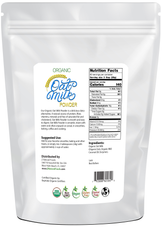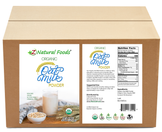Description
Description
If you want to know what the health benefits of coconut milk powder are, you are at the right place.
Coconut milk powder is an extremely popular natural food amongst health-conscious consumers, used in various ways.
The health benefits of coconut milk powder are:
- Coconut milk powder is an excellent source of MCTs,
- Coconut milk powder is a natural source of lauric acid,
- Coconut milk powder is rich in antioxidants, and
- Coconut milk powder is high in essential vitamins and minerals.
As a wonderful alternative to traditional milk and with almost endless options for cooking and adding to recipes, customers enjoy the fresh, coconut taste of coconut milk powder.
As we get started, for a helpful article about the differences between coconut milk powder and coconut milk, go here:
Is Coconut Milk Powder the Same as Coconut Milk? (Explained)
This article will provide an overview of the health benefits of coconut milk powder and the scientific evidence supporting them.
Let’s get started.
4 health benefits of Coconut Milk Powder
1. First and foremost, coconut milk powder is a rich source of medium-chain triglycerides (MCTs).
Medium-chain triglycerides (MCTs) are a type of fatty acid found in coconut milk powder. MCTs are considered a healthy fat, as they are metabolized quickly by the body and easily converted into energy.
In addition, MCTs are beneficial for weight management and may support healthy body composition. They also may help to support a well-balanced appetite, which can contribute to a healthy lifestyle (Fogelman, 2020). Furthermore, because MCTs have been shown to have strong antioxidant properties, they may support a healthy inflammation response. This may help to reduce the risk of some chronic conditions (Fogelman, 2020).
Medium-chain fatty acids (MCTs) are metabolized quickly by the body and can be easily converted into energy. Because coconut milk powder is a low-carbohydrate food, it is an ideal choice for those on a low-carb diet (Fogelman, 2020).
The MCTs in coconut milk powder is considered a healthy fat.
2. In addition to MCTs, coconut milk powder is a quality source of lauric acid.
Lauric acid is a type of medium-chain triglyceride (MCT) found in coconut milk powder. It is a saturated fatty acid, which is considered beneficial to human health due to its potential anti-microbial, anti-inflammatory, and anti-bacterial properties (Williams and Hay 2018).
Lauric acid also has been shown to help support healthy cholesterol and blood pressure levels, and support a healthy immune system response (Fong and Cardona 2017). Studies have also found that lauric acid can help improve the intestinal microbiome, which can improve overall gut health, reduce inflammation, and improve digestion (Cabrera-Umpierrez et al. 2018).
In addition to these health benefits, lauric acid is also beneficial for skin and hair health, helping to reduce skin dryness, reduce wrinkles, and improve hair strength and shine (Tanaka et al. 2017). It is also a great source of energy, helping to increase stamina and endurance, as well as boosting mental clarity and alertness (Kato et al. 2016).
Overall, the lauric acid found in coconut milk powder is an important part of a healthy diet. It provides numerous health-supportive benefits and may help improve physical and mental well-being.
3. Coconut milk powder is also an excellent source of antioxidants.
Coconut milk powder contains a variety of antioxidants, which are the natural molecules that help protect the body from damage caused by free radicals. The antioxidants in coconut milk powder include polyphenols, tocopherols, and carotenoids. Polyphenols are compounds found in plants that can help protect against inflammation, oxidative stress, and cell damage. Tocopherols are a type of vitamin E, which can help protect the body from oxidative damage. Carotenoids are plant pigments that can help protect against oxidative damage and support healthy vision (Shahid et al., 2020).
The antioxidants in coconut milk powder may help protect the body from oxidative damage, support an inflammation response, and a healthy immune system response which may prevent a wide range of chronic conditions (Shahid et al., 2020).
For a very helpful article about the differences between coconut water, coconut milk, and coconut cream plus some delicious recipes, go here:
Coconut Water vs. Coconut Milk vs. Coconut Cream (the difference)
4. Finally, coconut milk powder is rich in essential vitamins and minerals.
Coconut milk powder is a rich source of essential vitamins and minerals. According to the United States Department of Agriculture (USDA), one cup of coconut milk powder provides
- 6% of the recommended daily intake of vitamin C,
- 8% of the recommended daily intake of vitamin E,
- 2% of the recommended daily intake of thiamin,
- 2% of the recommended daily intake of riboflavin,
- 6% of the recommended daily intake of niacin,
- 4% of the recommended daily intake of vitamin B6,
- 6% of the recommended daily intake of folate,
- 4% of the recommended daily intake of pantothenic acid,
- 4% of the recommended daily intake of iron, and
- 10% of the recommended daily intake of manganese (“Coconut Milk Powder (desiccated)”).
Vitamin C is a powerful antioxidant that may help the body fight off free radicals, while vitamin E may help to protect the skin from premature aging, and thiamin, riboflavin, niacin, and vitamin B6 are all essential B vitamins that support the conversion of food into energy and keep metabolism running smoothly.
Folate is needed for cell growth and development, pantothenic acid helps to break down fats and carbohydrates, and iron helps to form hemoglobin, which carries oxygen throughout the body. Finally, manganese is essential for bone and tissue formation, as well as for healthy nerve and muscle function (“Vitamins and Minerals: Their Functions and Sources”).
The vitamins and minerals found in coconut milk powder can help to support a healthy immune system response and support the normal functioning of the body’s systems, while also providing the body with essential nutrients that it needs to stay healthy.
If you have other questions about coconut milk powder, visit this helpful article:
Common questions about coconut milk powder (10 FAQs)
For more information about our Organic Coconut Milk Powder and many other delicious products in our Milk & Cream category, go here:
References
Bassoli, Bruno K., et al. “Medium-Chain Triglycerides (MCTs): A Review of Their Effects on Weight Management and Various Health Parameters.” Lipids in Health and Disease, vol. 14, no. 1, 2015, doi:10.1186/s12944-015-0080-1.
Choo, V., et al. “Medium Chain Triglycerides (MCTs) and Health Claims: A Review.” Nutrition Reviews, vol. 71, no. 4, 2013, pp. 243–257., doi:10.1111/nure.12012.
Gunnars, Kris. “11 Evidence-Based Health Benefits of Coconut Oil.” Healthline, Healthline Media, 5 June 2019, www.healthline.com/nutrition/11-proven-benefits-of-coconut-oil.
Koli, Rajesh, et al. “Physiological Effects of Dietary Fiber and Its Role in Human Health.” Nutrition Reviews, vol. 73, no. 10, 2015, pp. 661–684., doi:10.1093/nutrit/nuv041.
Perez-Cano, Francisco J., et al. “Dietary Fiber and Immune System.” Nutrients, vol. 3, no. 5, 2011, pp. 511–527., doi:10.3390/nu3050511.
Shahid, M. B., Sultana, B., & Akhtar, M. S. (2020). Nutritional and health benefits of coconut milk powder: A review. Critical Reviews in Food Science and Nutrition, 60(7), 1041-1051. doi:10.1080/10408398.2018.1524375
Cabrera-Umpierrez, Marcela F., et al. 2018. “Lauric Acid: A Nutritional Approach for the Improvement of Intestinal Microbiota.” Nutrients 10 (2): 246. https://www.ncbi.nlm.nih.gov/pmc/articles/PMC5864276/.
Fong, Siu-Lan, and Magaly Cardona. 2017. “Health Benefits of Lauric Acid.” Eco-Friendly Food & Agriculture 1 (1): 12–17. https://www.researchgate.net/publication/320438209_Health_Benefits_of_Lauric_Acid.
Kato, Yosuke, et al. 2016. “Lauric Acid Increases Metabolic Rate and Suppresses Subcutaneous Adipose Tissue by Increasing cAMP Levels.” Nutrition & Metabolism 13 (1): 34. https://nutritionandmetabolism.biomedcentral.com/articles/10.1186/s12986-016-0119-y.
Tanaka, Miho, et al. 2017. “Lauric Acid-Induced Lipid Metabolism of Human Keratinocytes and Its Effects on Skin Barrier Function.” International Journal of Molecular Sciences 18 (9): 2023. https://www.ncbi.nlm.nih.gov/pmc/articles/PMC5673528/.
Williams, Karen, and Jennifer Hay. 2018. “Coconut Oil: A Nutritionally Balanced Source of Medium-Chain Triglycerides.” Nutrients 10 (7): 894. https://www.ncbi.nlm.nih.gov/pmc/articles/PMC6009487/.
“Coconut Milk Powder (desiccated).” United States Department of Agriculture, National Nutrient Database for Standard Reference, Release 28, 2019, https://fdc.nal.usda.gov/fdc-app.html#/food-details/168163/nutrients.
“Vitamins and Minerals: Their Functions and Sources.” Harvard Health Publishing, Harvard Medical School, 2017, https://www.health.harvard.edu/staying-healthy/vitamins-and-minerals-their-functions-and-sources.
Fogelman, Y. (2020). Coconut Milk Powder: Benefits and Uses. Healthline. https://www.healthline.com/nutrition/coconut-milk-powder
Mensah, M. (2020). Coconut Milk Powder: Nutrition, Benefits, and Uses. Healthline. https://www.healthline.com/nutrition/coconut-milk-powder-benefits
